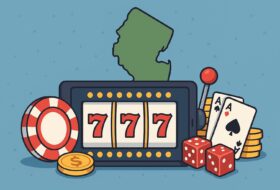
The United States regulates gambling more heavily than most other industries. Legal gambling must comply with legal regulations from the federal Bank Secrecy Act to local rules governing gaming. Regulators, law enforcement officials, and casino employees step scrutinize every step of a gambling machine’s lifetime, from production through delivery and installation. These are only some of the precautions that gaming companies must make throughout their supply chains to keep bettors safe.
However, other companies find loopholes in state and federal gambling laws. These loopholes let shady companies infiltrate the gaming market. One of the most common ways to do this is with illegal gambling machines. These machines have operating rules that take advantage of legal technicalities.
For example, no-chance slot machines look like regular slot machines. However, they tell bettors what all their next plays’ outcomes will be. These machines’ owners claim this eliminates the chance associated with “games of chance.” However, few lawmakers are dumb enough to fall for that. Random number generators deciding outcomes many spins ahead still include chance. The company that made them was sued by Missouri for violating the state’s gambling law. However, its founder maintained that projecting slot outcomes several turns out eliminated chance, anyway.
Whether the founder is ignorant or cynical is anyone’s guess.
Other types of gambling machines that skirt around gambling law harm the legal gambling industry. They undermine public confidence in legal, regulated gambling products and companies. They capture tax revenue that states use for state education. But at their worst, they can fund criminal activities. That makes licensed gambling companies motivated to snuff bad actors like these out.
Legal Gambling Industry Safeguards
The American Gaming Association authored a short white paper describing the contrast between regulated and unregulated gaming devices. The most striking thing about the white paper’s analysis was the many guardrails in place for regulating gambling devices.
We’ve covered the process that gaming companies go through to get their state licenses. In our sportsbook reviews, we often touch on the background checks and the financial histories gaming companies must submit. However, the safeguards go much deeper than background checks on executive boards. Gambling machine manufacturers have many hoops to jump through, too.
First, all the hardware and software must conform to state regulatory standards. Submitting and verifying all that code is part of their manufacturing license requirements. It’s an early step that tells regulators whether the gaming machines are:
- Secure
- Fair
- Consistent
This kind of security ensures that gaming machines aren’t hacked by wannabe jackpot winners. So, when gamblers play a regulated gaming machine, the odds are clear and consistent. Even updates over the machine’s life shouldn’t change the rules gamblers play by. These regulations protect bettors by making sure gamblers and casinos play by the same rules.
But when they arrive, gaming machines remain subject to scrutiny. As the AGA white paper points out, gaming machines can only be unpacked by “approved employees, law enforcement, or regulators.” This prevents anyone from tampering with machines to change the rules that regulated machines operate by. All the way through installation, regulated gaming machines remain under guard. These precautions ensure gaming machines are fair when they’re shipped out and when they’re updated throughout their lives on the casino floor.
Unregulated Gaming Machines
Gamblers may gawk at the protocols that regulated gambling machines follow. But gamblers will be equally surprised at unregulated gambling machines’ freedom. Unregulated gambling machines:
- May not be tested for fairness or consistency.
- Aren’t required to meet the same safety standards as regulated machines.
- Don’t offer responsible gaming resources.
Unregulated gaming machines don’t have to uphold the same standards as regulated machines. So, many don’t. Even worse, since unregulated machines aren’t subject to gambling law, they can be placed anywhere. Regulated machines stay in casinos or other gaming parlors. (Some states have casino alternatives.) However, an unregulated machine could be in some bar or restaurant. It probably wouldn’t have the identity checks that a licensed online sportsbook has. Add poor supervision to the mix, and suddenly communities have gambling machines open to minors who shouldn’t be gambling in the first place.
It’s a far cry from the standards the gaming industry demands for its legitimate players.
What About Innovation?
Some companies that build unregulated gaming machines may justify their shady interpretations of gambling law by invoking the spirit of innovation. They may think that they found some new idea the industry hasn’t thought of yet. It may even be true.
But an idea isn’t good just because it’s innovative. These unregulated machines depend on legal loopholes designed to keep gamblers safe. Finding creative ways to flaunt them may be innovative. But it puts gamblers at risk just to compete in an industry with high barriers to entry. It’s hard to get a gaming license because there are so many protections in place for gamblers. Creeping around those requirements for an extra buck is unethical and undermines the legitimate companies that work hard to protect gamer integrity.
What We Can Do About Unregulated Gambling Machines?
Regulated gaming machines are some of the safest gambling devices on the market. They’re protected from the moment manufacturers decide to sell to gambling companies to the time machines are installed in casinos. However, unregulated gaming devices circumvent those critical regulations. They’re more vulnerable to hackers than their regulated counterparts. They may glitch over time and change unfairly change payout rates. At their worst, business owners ignore them, leaving gambling addicts and minors to play them with impunity.
However, we can do three things. First, lawmakers can close the loopholes unregulated gambling machines depend on. Law enforcement can also crack down on these machines where they have the authority to do so. Second, states and local communities can avoid authorizing them. Legitimizing a caste of gaming machines that are exempt from regulation is dangerous for gamblers and the gaming industry. Finally, other industries must avoid using these unregulated machines. Profiting from those machines isn’t worth it.
Unregulated gambling machines undermine an industry whose legitimacy comes from its strict industry standards. Basic features like payout tables are reliable because of the regulations governing gaming machine manufacturers. Everyone in the supply chain follows stringent protocols to make sure gamblers know what they’re getting into. The idea of fair gambling may seem paradoxical to some. But when gamblers understand the odds, they can make informed choices about their gambling choices. And combatting unregulated gambling machines is a critical part of the wider effort to maintain a legitimate gambling industry.





